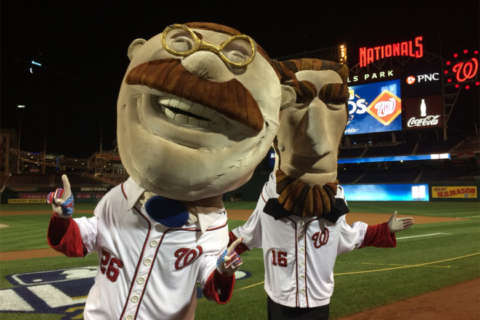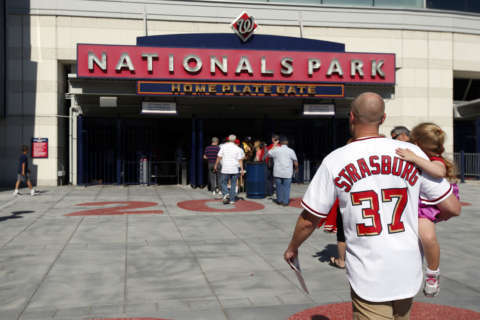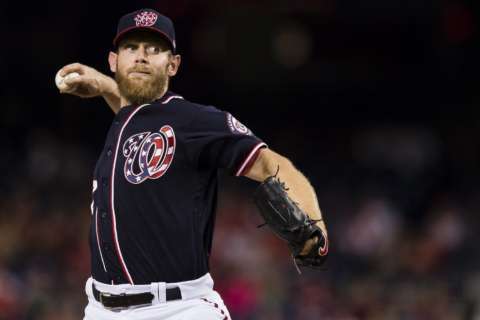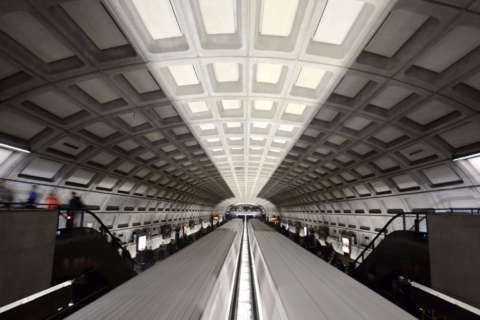WASHINGTON — It’s October, the Washington Nationals are back in the playoffs, and here we are again.
For the fourth time in six years, the team and the public transit system best positioned to deliver thousands of fans to and from the game are at an impasse that may wind up forcing those fans who attend home games on South Capitol Street to either leave a postseason game early or risk being stranded without a ride home.
In the seventh inning of Game 5 of the 2016 NLDS, just minutes before 11 p.m., the team posted the departure time of the final train with an available transfer to the rest of the system from the Navy Yard Metro station. Boos rained from the crowd, though the transit system bore the brunt of the bad PR in the moment, with a chant of “Metro sucks” emanating from the stands.
That’s why D.C. Council member and Metro Board Chair Jack Evans was adamant last week about the state of affairs heading into this year’s postseason.
“Let the record be clear that it is up to the Washington Nationals to pay for the late-night hours. If they choose not to pay, then it will not stay open and it is not Metro’s fault, so we don’t want to get Metro booed at one of these games again, because it’s not our decision whether it stays open late or not,” he told WTOP.
Metro is willing to stay open late for special events, but the cost to an organization paying to extend service has risen dramatically to do so. In years past, a $29,500 deposit was required to be put in escrow in advance, to be released as needed to pay for an extra hour of service. Organizations were then paid back for whatever fares are actually used during that extra hour.
The Washington Capitals have a standing agreement with Metro to pay for late playoff finishes. In the past, other teams have paid to keep the system running. This includes the Nationals, who did so for the May 2012 Sunday Night Baseball tilt with the Philadelphia Phillies, but have not since then.
When the 2012 postseason (the franchise’s first in D.C.) rolled around, a Nationals official claimed that MLB did not want to set a precedent by paying for transit systems to stay open. Living Social stepped in that year to offer to pay, as did American University in 2014, but the situation never came to a head until last year.
Now, the problem has gotten more expensive.
With Metro struggling financially and downtime to make repairs and improvements at more of a premium, the bill to keep the system open has spiked to $100,000. Considering the Nats only made $1,611 back from the scant 445 passengers who used the system that Sunday night game, even with a far greater level of participation for a sold-out playoff affair would mean spending tens of thousands of dollars. But with ticket revenue alone netting potentially $5 million per game or more (not even counting for concessions, merchandise, parking, etc.), the dent seems far less damaging.
And considering the organization received over $700 million in taxpayer money for their ballpark, holding a public standoff against a cash-strapped public utility might seem like poor form. But it’s easy to win a popularity contest against Metro in this town, at least the first time around. However, the transit system’s reduced hours combined with the prime time-heavy later rounds of the playoffs mean the team will continue to be confronted with this issue again and again the further they advance.
A stroke of scheduling fortune has put the immediacy of the issue on hold again, at least until a potential Game 5 of the NLDS. Games 1 and 2 are on Friday and Saturday night, when Metro doesn’t close until 1 a.m. Barring a rain delay or a particularly long extra-inning affair, a 7:30 p.m. Game 1 first pitch won’t threaten that. But with an 11:30 p.m. Monday-Thursday closing time, even earlier than last year, a prime-time Game 5 would present serious trouble. Last year, first pitch was at 8:08 p.m., the final out not recorded until 12:40 a.m.
If the Nats advance and draw the Dodgers, games 3, 4 and 5 (if necessary) would be likely prime-time games at Nationals Park on a Tuesday through Thursday night, each game potentially creating Metro drama. The World Series could likewise present the same issues for anywhere from one to four games, depending on which team ends up with home field advantage.
The Nationals appear to be happy to simply ignore the issue in hopes it will go away. They did not respond to a WTOP request last week as to whether they were engaged in talks with Metro. They also did not respond to a follow up correspondence this week about whether or not they had received any guidance from MLB on how to handle the issue.
It would be plausible — and, to a degree, understandable — that MLB wouldn’t want other teams to have to share in one organization’s transportation cost issues. After all, every team’s finances are partially tied together through the league’s revenue sharing program, as outlined in the MLB Collective Bargaining Agreement. But the defined gross revenue that each team accrues and is reported for these purposes each year does not include postseason revenue.
Per Article XXIV:
(3) “Defined Gross Revenue” shall mean the aggregate operating revenues from baseball operations received, or to be received on an accrual basis, as reported by each Club on an annual basis in the Club’s FIQ, but shall not include postseason revenue.
The league neither verified nor disputed this point. For its part, MLB seems to want nothing to do with the issue. “MLB has not been responsible for or involved in the issue of local public transportation,” a league official told WTOP in a statement.
Meanwhile, Metro continues to defer back to the club, whose silence is deafening. The club continues to promote its nationals.com/waytogo URL for transportation methods to the game.
The top method listed is Metro.








